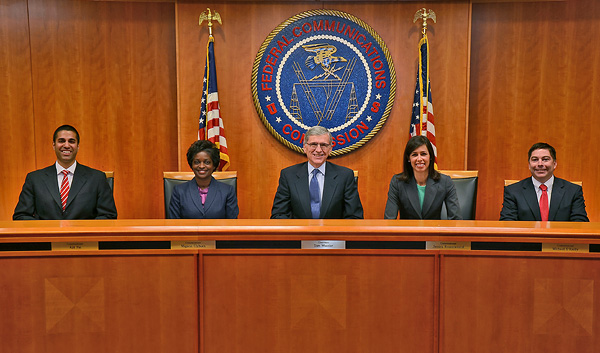Tired Of Telemarketers? So Is The FCC
Telemarketers have been a real annoyance to everyone over the last few decades. Although the FCC is not the source of these calls, it is not uncommon for the Commission to receive consumer complaints over unwanted robocalls and telemarketers. Although there have been some attempts in the past to resolve these issues, it persists as a growing problem. Now the FCC plans to help develop technologies to block these unwanted calls going to both landline and mobile phone users.
The FCC's Role
The FCC's plan to encourage the development of these "do-not-disturb" technologies is fairly simple. Each week, the FCC receives numerous user complaints about telemarketers. The commission collects data from these complaints, including the phone number used by the telemarketer or robocaller. The FCC will then release this information to developers, who will create software to prevent calls from these numbers.
"Consumers want and deserve effective tools to empower them to choose the calls and texts they receive. This data will help improve do-not-disturb technologies so they can provide the best service for consumers," said Alison Kutler, chief of the FCC's Consumer and Governmental Affairs Bureau, which manages consumer complaints. "As we encourage providers to offer these services, and as the Commission recently made clear that there are no legal barriers to doing so, we continue to look for ways to help facilitate important consumer tools."
The FCC has made attempts to prevent telemarketers in the past, such as its "Do Not Call" lists, but this only prevents calls from companies that abide by the FCC regulations. Today, as the world continues to develop, calls from other nations not subject to the FCC are becoming a growing problem, however, and there is nothing currently in effect to stop these calls.
Although software capable of blocking calls from telemarketers already exists in the form of smartphone apps and VoIP phone systems, most service providers don't directly offer these services to consumers, and landline users don't have tools capable of providing this service.
Will Carriers Develop "Do-Not-Disturb" Technologies?
Although the option to have unwanted calls from telemarketers blocked automatically may seem like an obvious service that carriers should provide, it is still questionable if they will do so.
On the one hand, the FCC is doing a considerable amount of the work by collecting a list of numbers that should be blocked, and it should be relatively easy for carriers to develop the software. Further, it's an extra service that companies could potentially charge for to increase revenue.
Get Tom's Hardware's best news and in-depth reviews, straight to your inbox.
All of this sounds great, but it is likely to spark a negative reaction from companies that rely on telemarketing services. If these telemarketing companies feel that these programs are causing a significant cut into their profits, they may pay phone carriers to unblock their phone numbers or to not use these "do-not-disturb" technologies.
Either way, phone carriers will likely benefit from this change in FCC policy, either by charging users for a new service or by being paid by telemarketers not to block their calls, but it is hard to say how much it will help customers avoid unwanted calls.
______________________________________________________________________
Michael Justin Allen Sexton (or MJ) is a Contributing Writer for Tom's Hardware. As a tech enthusiast, MJ enjoys studying and writing about all areas of tech, but specializes in the study of chipsets and microprocessors. In his personal life, MJ spends most of his time gaming, practicing martial arts, studying history, and tinkering with electronics.
Follow Michael Justin Allen Sexton @EmperorSunLao. Follow us @tomshardware, on Facebook and on Google+.
-
tom10167 nice to see the FCC cracking down on something that hasn't affected anyone in 10 years. where were you in the 90s?Reply -
littleleo I get calls every so often in the evening and it is really annoying. I'll pick-up and tell them not to call me I'm on the national do not call list, and they will tell me they are just dialing numbers randomly (BS). So I tell them well now you know, so note my number and don't call it again or I will file a notice against your company and request damages for harassment. That seems to end them calling again but it is still annoying having to do that, so now I just screen and it it isn't someone I want to talk to they get VM and are deleted right away.Reply -
skit75 I added my land-line to the national do not call list when it first came out and within 1 week the calls had easily tripled. I canceled the service and had the land line ripped out before the next weekend, never to return. What a joke. If I get a call on my cell now, I just ask them for their home number and inform them I will give them a call when they get off work. 1...2....3.... seconds of silence and click.Reply -
patrick47018 Replynice to see the FCC cracking down on something that hasn't affected anyone in 10 years. where were you in the 90s?
You don't think that telemarketing isn't still a thing? It is still HUGE -
anoldnewb Heavily fine the businesses that use illegal telemarketers. Split the find with those that turn them in.Reply
-
littleleo Reply16820338 said:People call me for money all the time but its not telemarketers.
Tell them your on the national don't call list and see if that helps, lol. Otherwise welcome to the world call screening. -
thx1138v2 This is not hard to do on a landline. Attach a dialup modem to a computer COMx port or USB port, grab the Caller ID info out of the incoming call, and look it up. If it's in the denial list there are a number of options built into the modem to use. You can throw a fax handshake at them and then disconnect or use Special Information Tones (SIT) to send a "line disconnected" tone. The SIT's are those tones you hear just before you get a message from the phone company like the ".. is not a working number" message. They use tones so they can be internationally recognized by the equipment and the message can be delivered in the local language.Reply
In the U.S., however, the Caller ID information comes over the line between the first and second rings so you always hear the first ring. If you don't hear a second ring the computer terminated the call. Makes me smile every time.
My software logs the calls and displays a list. If a new call comes in that isn't recognized but it turns out to be an unwanted call you just double click on the item in the list and add it to the denied numbers list. Plus you have a log of all calls if they truly are harassing you.
After a while they stop calling. I've heard that if you use the Line Disconnected SIT their software will remove your number from the their lists but I don't know about that for sure. -
Simple fix is to close the technical loophole that allows the caller to modify the caller ID and place that facility with the provider only. Then mandate that the ID can be changed only under very specific conditions:Reply
1. The requested number MUST ring to a live person (no recordings allowed) 24/7
2. The requested number MUST be registered to the person/company making the request.
No third parties and NO exceptions.
Then make all third parties that provide these so called conference call setups that mask the origin of the call equally culpable in any civil or criminal action. This includes providers.
That's the quick and dirty version. There would of course be some legit exceptions.

